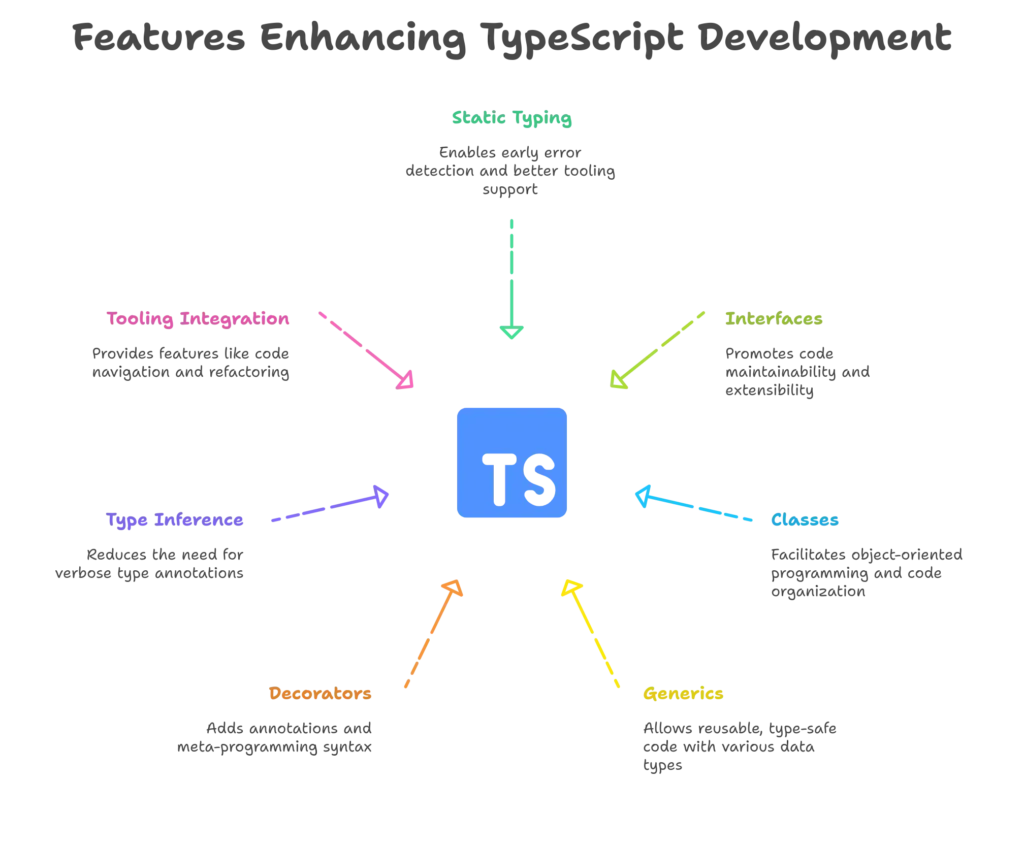What is typescript ?
TypeScript is an open-source programming language developed by Microsoft. It is a superset of JavaScript, meaning that any valid JavaScript code is also valid TypeScript code. TypeScript adds optional static typing to JavaScript, which helps in catching errors during development and making code more maintainable.
Why TypeScript?
- Static Typing: TypeScript allows developers to define types for variables, parameters, and return values, which helps in identifying errors early in the development process.
- Enhanced Tooling: TypeScript provides features like code navigation, refactoring, and intelligent code completion, making development easier and faster.
- Readability and Maintainability: With explicit types, code becomes more self-documenting and easier to understand for developers.
History of TypeScript
TypeScript was first announced by Microsoft in October 2012. Anders Hejlsberg, known for his work on Turbo Pascal, Delphi, and C#, led the development team. The primary goal was to address the challenges of large-scale JavaScript application development by adding optional static typing and other features to JavaScript.
- 2012: Announcement of TypeScript.
- 2013: TypeScript 0.8 released, introducing classes, modules, and generics.
- 2014: TypeScript 1.0 released, considered stable for production use.
- 2016: TypeScript 2.0 released, adding support for non-nullable types and control flow analysis.
- 2019: TypeScript 3.0 introduced features like tuples in rest parameters and spread expressions.
Features of TypeScript
Static Typing: TypeScript allows developers to define types for variables, parameters, and return values, enabling early error detection and better tooling support.
Interfaces: Interfaces define the structure of objects, promoting code maintainability and extensibility.
Classes: TypeScript supports class-based object-oriented programming, making it easier to organize code into reusable components.
Generics: Generics enable writing reusable, type-safe code by allowing the creation of components that can work with a variety of data types.
Decorators: Decorators provide a way to add annotations and meta-programming syntax to classes and their members, facilitating features like dependency injection and aspect-oriented programming.
Type Inference: TypeScript’s type inference feature infers the types of variables when types are not explicitly specified, reducing the need for verbose type annotations.
Tooling Integration: TypeScript integrates well with popular development tools like Visual Studio Code, providing features like code navigation, refactoring, and intelligent code completion.

Uses of TypeScript
Large-Scale Web Applications: TypeScript is well-suited for building large-scale web applications where code maintainability and scalability are crucial.
Library Development: Many libraries and frameworks, including Angular and NestJS, are written in TypeScript, making it a preferred choice for library development.
Node.js Development: TypeScript can be used for server-side development with Node.js, offering advantages like type safety and better code organization.
Cross-Platform Development: TypeScript can target multiple platforms, including browsers, Node.js, and even mobile platforms using frameworks like NativeScript or React Native.
Advantages of TypeScript
Static Typing: TypeScript’s static typing allows developers to catch errors during development rather than at runtime, leading to more robust and reliable code.
Code Readability and Maintainability: By adding explicit types and interfaces, TypeScript code becomes more self-documenting, making it easier for developers to understand and maintain the codebase over time.
Enhanced Tooling Support: TypeScript integrates seamlessly with popular development tools like Visual Studio Code, providing features such as code navigation, intelligent code completion, and refactoring tools, which boost developer productivity.
Early Error Detection: The static type system of TypeScript helps in detecting errors like typos, incorrect method calls, and type mismatches during development, reducing the likelihood of bugs in production code.
Code Scalability: TypeScript is well-suited for large-scale applications due to its support for features like modules, classes, and interfaces, which enable developers to organize and scale their codebases more effectively.
Compatibility with JavaScript: TypeScript is a superset of JavaScript, meaning that existing JavaScript code can be gradually migrated to TypeScript without requiring significant changes, allowing for a smooth transition for existing projects.
Rich Ecosystem: TypeScript has a thriving ecosystem with a wide range of tools, libraries, and frameworks built specifically for TypeScript, providing developers with ample resources to build robust applications.
Community Support: TypeScript has a large and active community of developers who contribute to its development, create educational resources, and provide support through forums and social media platforms, making it easier for developers to learn and adopt the language.
Disadvantages of TypeScript
Learning Curve: Developers transitioning from JavaScript to TypeScript may face a learning curve due to the additional concepts like types, interfaces, and decorators.
Build Process Overhead: Adding TypeScript to a project introduces a build step to compile TypeScript code to JavaScript, which can increase build times and complexity.
Type Definitions for Libraries: While many popular libraries have TypeScript type definitions available, not all libraries do, which may require developers to write or find type definitions.
Tooling Dependencies: To fully leverage TypeScript’s features, developers often rely on specific tooling like Visual Studio Code, which may not be preferred by all developers or teams.
TypeScript is a powerful language that brings static typing and other advanced features to JavaScript, making it easier to build large-scale applications. By leveraging TypeScript's features such as static typing, interfaces, classes, generics, and decorators, developers can write more robust and maintainable code. Happy coding !❤️
